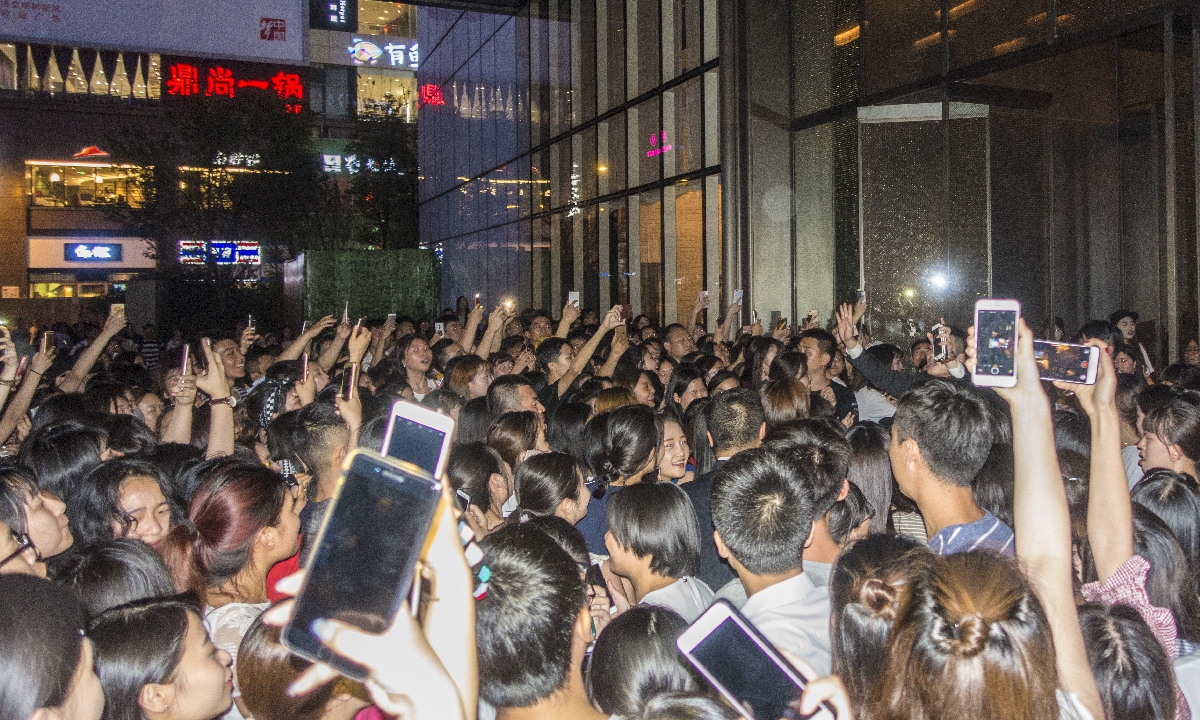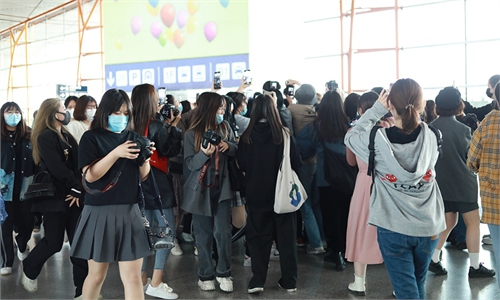'Fan circle' runs like cults, easy to become 'target of overseas forces to split Chinese society'

Hundreds of fans gather outside a hotel where Chinese-Canadian pop idol Kris Wu was staying in Chengdu, Southwest China's Sichuan Province, in 2017. Photo: VCG
Fans think that they are simply participating in an organization to better support and get close to their idols, but, behind the curtain, what they could not see is not only profit-seeking capital eager to manipulate their minds with carefully carved images of their idols, but also dangerous forces awaiting an opportunity to use them to split Chinese society.
With an idol who has been carefully beautified and deified, a group of young fanatical followers and a behavioral model to crack down on dissenters, "it [fanquan, or fans circles] runs like a cult," Li Ming (pseudonym), who works for a marketing company as a project leader in the entertainment industry, told the Global Times.
According to a report on Chinese juvenile netizens in 2020, nearly 30 percent of students from elementary to high schools had joined online support activities for their idols.
The industry has been using a psychological strategy to run fandom groups - many of whose members have not formed a strong sense of self, nor the capacity to differentiate between right and wrong - in an organized way, leading young fans to give up their sense of self and turning them into "data workers," according to Li.
The development direction of fanquan is to deify the idol to control and push the fans at the bottom to do the work. It is the same model as pyramid selling, Shen Yi, a professor at the School of International Relations and Public Affairs of Fudan University, told the Global Times.
Some fans have told reporters that a fan has to finish a certain amount of tasks per day to join a star's fan club, including following the star's Sina Weibo account, reaching at least level 10 on the star's super topic society on Weibo, and commenting on at least 50 posts. Even so, the fan may be declined.
It takes at least two months for a fan to reach level 10 on a star's super topic society on Weibo by visiting the society and making posts every day, according to the fans.
Some fans even work harder for the idols as atonement if they think their behaviors bring about troubles and criticism to the idols.
An example is the more united and low-key fanquan of actor and singer Xiao Zhan after a fierce verbal fight between Xiao's irrational fans and users of fiction site Archive of Our Own.
Xiao's fans reported the website for letting some users host love stories featuring their idol and his male co-star Wang Yibo from the hit TV drama The Untamed, leading to the site being banned in China and Xiao being criticized by official media for fanquan chaos.
The fans have been given the idea that "love is more important more than money," therefore, among the fans, the common logic is "If you love your idol, you have to pay for them. If you don't pay, then you don't love them" has been formed, so fans will volunteer to empty their pockets, Li explained.
This mode gives fans engagement in their idols' success. In other words, it actually takes advantage of people's desire to peep and control, she said.
It is common for fans to raise money to buy goods from luxury brands like Chanel and Hermes for their idols' birthdays. Most fans are not rich, but they would rather live frugally to support their idols to gain a sense of inner satisfaction, the Global Times learned from fans.
There is a star-chasing model called "developing an idol" in Chinese fanquan. It means that the fans follow the idols from the time the idols are very young, and they contribute money and time to promoting the idol's career, like raising a child. The fans are very proud if the idol grows up as they expect, but they fly into a rage if the child shows any sign of insubordination.
A typical example is the smoking incident of popular boy band TFBOYS member Wang Yuan in May 2018.
After being caught smoking at a restaurant in Beijing, where indoor smoking is banned, a flood of Wang's fans wrote on social media that they were shocked, disappointed and might even "fall out of love" with Wang, criticizing him for ruining his "good boy" image.
Wang, 21, has more than 83 million followers on Weibo. Before the incident, he was listed by Time magazine as one of the 30 most influential teenagers and appointed as a UNICEF Special Advocate for Education in 2017.
Following some idols' behavior that either seriously violated Chinese laws or harmed the Chinese people's national sentiment, such as the tax evasion case of actress Zheng Shuang, the rape accusation against Chinese-Canadian rapper Kris Wu and the visit of actor Zhang Zhehan to the Yasukuni Shrine in Japan, Chinese authorities launched a fierce joint campaign to clean up the entertainment industry and end the chaos in fanquan.
Many stars' studios, including that of top idol Wang Yibo, have initiated proposals to maintain a rational fan community.
However, Shen noted that current measures could only deal with the stars or fans, who have done something illegal or apparently wrong, which leaves a vacuum for the management of the fanquan of stars who do not have apparent problems.
But in the end, all fanquan groups would move in a direction to affect others and attack those who do not agree and create conflicts on the internet.
Such conflicts would probably be used by ill-intended external forces to make use of fanquan chaos to split Chinese society, Shen warned.
On October 5, 2020, some fans of actor and singer Xiao Zhan in Southwest China's Sichuan Province, which is adjacent to the Tibet Autonomous Region, gathered to celebrate his birthday.
Zhan is a Chinese character that means fighting. Xiao's fans have a slogan reading "We came for Zhan, despite being surrounded by gunpowder."
However, the slogan and the gathering were twisted by some users on Twitter who said that these people had gathered to protest for the independence of Tibet, and what they shot was "they came for fighting." These Twitter users even depicted Xiao as a democracy hero.
In the end, all fanquan in the malformed entertainment industry would be rectified in order to create a clear, healthy environment for youngsters, as well as to cultivate youngsters with correct values, Shen said.
He said that some Western people may not understand these moves, taking them as crackdowns on cultural freedom. But i the moves should be viewed as having the same intention as that of Facebook and Twitter to suspend Donald Trump's accounts, as his speeches would misguide his followers and at last threaten the country's political security.



